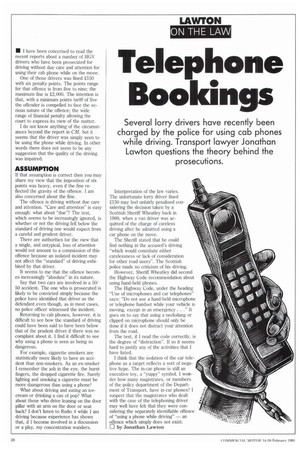Telephone Bookings
Page 30

If you've noticed an error in this article please click here to report it so we can fix it.
Several lorry drivers have recently been charged by the police for using cab phones while driving. Transport lawyer Jonathan Lawton questions the theory behind the prosecutions.
• I have been concerned to read the recent reports about a number of HGV drivers who have been prosecuted for driving without due care and attention for using their cab phone while on the move.
One of those drivers was fined 2150 with six penalty points. The points range for that offence is from five to nine; the maximum fine is 22,000. The intention is that, with a minimum points tariff of five the offender is compelled to face the serious nature of the offence; the wide range of financial penalty allowing the court to express its view of the matter.
I do not know anything of the circumstances beyond the report in CM, but it seems that the driver was simply seen to be using the phone while driving. In other words there does not seem to be any suggestion that the quality of the driving was impaired.
ASSUMPTION
If that assumption is correct then you may share my view that the imposition of six points was heavy, even if the fine reflected the gravity of the offence. I am also concerned about the fine.
The offence is driving without due care and attention. "Care arid attention" is easy enough: what about "due"? The test, which seems to be increasingly ignored, is whether or not the driving fell below the standard of driving One would expect from a careful and prudent driver.
There are authorities for the view that a single, and untypical, loss of attention would not amount to a commission of this offence because an isolated incident may not affect the "standard" of driving exhibited by that driver.
It seems to me that the offence becomes increasingly "absolute" in its nature.
Say that two cars are involved in a 50/ 50 accident. The one who is prosecuted is Likely to be convicted simply because the police have identified that driver as the defendant even though, as in most cases, no police officer witnessed the incident.
Returning to cab phones, however, it is difficult to see how the standard of driving could have been said to have been below that of the prudent driver if there was no complaint about it. I find it difficult to see why using a phone is seen as being so dangerous.
For example, cigarette smokers are statistically more likely to have an accident than non-smokers. As an ex-smoker I remember the ash in the eye, the burnt fingers, the dropped cigarette fire. Surely lighting and smoking a cigarette must be more daangerous than using a phone?
What about driving and eating an icecream or drinking a can of pop? What about those who drive leaning on the door pillar with an arm on the door or seat back? I don't listen to Radio 4 while I am driving because experience has shown that, if I become involved in a discussion or a play, my concentration wanders. Interpretation of the law varies. The unfortunate lorry driver fined £150 may feel unfairly penalised considering the decision taken by a Scottish Sheriff Wheatley back in 1989, when a van driver was acquitted of the charge of careless driving after he admitted using a car phone on the move.
The Sheriff stated that he could find nothing in the accused's driving "which would constitute either carelessness or lack of consideration for other road users". The Scottish police made no criticism of his driving.
However, Sheriff Wheatley did second the Highway Code recommendation about using hand-held phones.
The Highway Code, under the heading "Use of microphones and car telephones" says: "Do not use a hand-held microphone or telephone handset while your vehicle is moving, except in an emergency . . ." It goes on to say that using a neckslung or clipped on microphone should only be done if it does not distract your attention from the road.
The test, if I read the code correctly, is the degree of "distraction". If so it seems hard to justify any of the activities that I have listed.
I think that the isolation of the car telephone as a target reflects a sort of negative hype. The in-car phone is still an executive toy, a "yuppy" symbol. I wonder how many magistrates, or members of the policy department of the Department of Transport, have in-car phones? I suspect that the magistrates who dealt with the case of the telephoning driver may well have felt that they were considering the separately identifiable offence of "using a phone while driving" — an offence which simply does not exist, LI by Jonathan Lawton








































































































